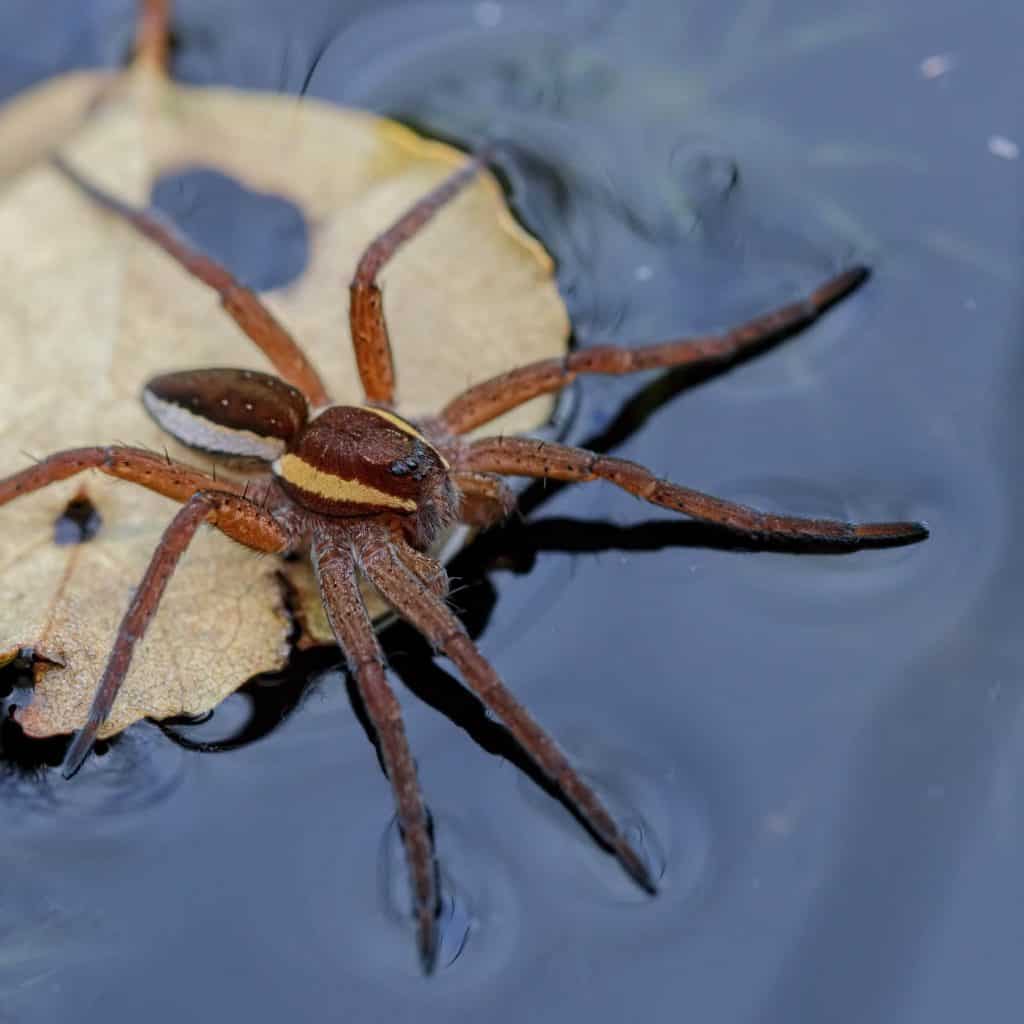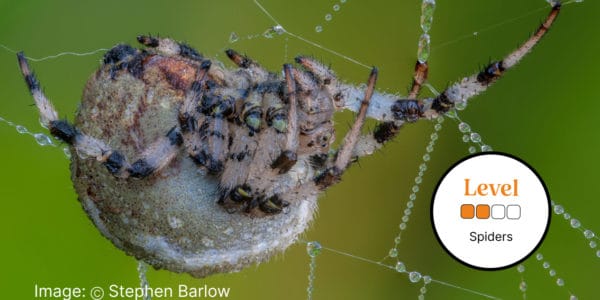This introductory through to beginner online course will introduce you to some of our planet’s most misunderstood invertebrates, introducing aspects of spider biology and ecology and it aims to give learners the skills and confidence before delving into species identification.
This course introduces learners to the general body plan of a spider, their ecological roles within ecosystems and discusses the array of webs our UK species can produce. We also delve into how spiders have influenced human cultures and technology globally.
What will be covered during this course?
- Spider Biology
- Spider Silk and Spider Webs
- Spider Behaviour and Attitudes to Spiders



Read More
There are an estimated 43,000 species of spider found worldwide with over 650 found in Britain alone – despite this they are often overlooked and under-recorded as a group.
If you’re interested in finding out more about spiders but don’t feel ready for a beginner’s identification workshop, then this is the course for you.
This is a 3-week online course covering 3 topics, for which you will complete a variety of self-led online resources and activities. Each topic is then concluded with an interactive Zoom workshop to complement the online content. Time commitment is approximately 3-5 hours a week and an E-certificate is provided upon completion.
What is covered in this course?
- Spider Biology will introduce spiders as a taxonomic group and how they differ from other invertebrate groups. By the end of this section, learners should be able to identify the main body parts of a spider and their functions. Learners will also look at a spider’s generalised lifecycles and their roles within the ecosystems.
- Spider Silk and Spider Webs will look at the types, structure and uses of spider webs.
- Spider Behaviour and Attitudes to Spiders will look at the types of behaviour exhibited by spiders including the various styles of hunting exhibited by different groups of spiders. Learners will also be able to identify different forms of mating behaviours and ways in which spiders disperse from their hatching site.
We also look at human attitudes to spiders, we explore the roots of fear and why spiders are so often feared by others. Learners will be shown examples of media coverage on spiders and look at the facts behind those reports. Learners will also be shown some examples of how spiders are represented across different human cultures historically on a global scale.
Who Should Attend? – Nature enthusiasts, Students, Rangers, Early career ecologists.
Knowledge Level – Introductory through to beginner. Level descriptors can be found on the following webpage: Framework and Course Level Descriptors.
Prior Knowledge – No existing knowledge or experience is needed for this course. Just a willingness to explore and learn.
Please note that bookings will close 2 working days before the course start date to allow for all participants to be enrolled to the online platform – bookings will not be taken after this time. Bookings will close sooner if course capacity is reached
Understand how our online courses are delivered.
Live Webinar
There are 3 webinars for this course, taking place weekly. Please see the date listing below for the day and time.
Please note – webinars will be recorded and uploaded to the virtual learning platform for learners unable to attend.
Tutor Information
Dave Willis
Dave is a ‘People and Wildlife Officer’ for the Herts and Middlesex wildlife trust. He is also the founder of the Herts Amphibian and Reptile Group and active member of the Hert’s invertebrate project where he helps record Hertfordshire’s spider fauna.
Example Timetable
Week 1: Spider Biology
Self-study material available at course start date
Week 1 live webinar at end of week 1
Week 2: Spider Silk and Spider Webs
Self-study material available: after week 1 webinar
Week 2 live webinar at end of week 2
Week 3: Spider Behaviour and Attitudes to Spiders
Self-study material available after week 2 webinar
Week 3 live webinar at end of week 3
Time commitment: This course will require approximately 3-5 hours of your time each week. This includes covering course materials on our Moodle learning platform and the zoom session.
What's Included
The course has been carefully created to help you continue to build on your knowledge as the course progresses. With content crafted to the online Moodle Platform and bespoke to the Field Studies Council.
The course includes:
- 3-week online course for adults, time commitment of 3-5 hours per week
- Access to study content, activities and tutor-graded assignments through our virtual learning platform.
- Access to weekly live virtual classroom sessions at the end of each week with the course tutor through Zoom (recorded for those that are unable to attend the live sessions).
- E-certificate upon course completion.
- Please note that this course is NOT a species identification course.
- Learners will benefit from having access to a 10X hand lens to get the most out of this course.
Once registered, you will follow well-illustrated, user friendly ’books’ to pick up knowledge. Quizzes and skill-checks will give you instant feedback on your learning. Forums give students the chance to interact with each other as well as a place to share work.
Bursaries and Subsidies
Student Discount
This course is eligible for a student discount. If you are a current student, please use discount code BioStudent20 at checkout for 20% off all Biodiversity courses.
Before You Attend
Accessing Your Course
Once you sign up you’ll receive an email at least 24 hours in advance of the course opening with details of how to access our easy-to-use platform, Moodle.
Moodle can be accessed through a browser or an app.
Webinars are via Zoom so you won’t need any new software to attend.
Recommended Devices
It is recommended that you access your course through a PC or laptop. Please be aware that there will be reduced functionality if you decide to access the course through a tablet or smartphone. The Field Studies Council is unable to email content directly to you.
Opportunities to attend this course
This course is not currently available to book. Dates will follow soon.
Sign up to our Email Newsletter
Progress Your Learning
This is a training course from the Field Studies Council, delivered by expert tutors with an approachable learning style. After attending this course, you may like to progress your learning with further relevant courses or branch out into other areas of natural history. The Field Studies Council offers both online and in-person courses, so you can choose the learning style that suits you best.
The course gives you the opportunity to immerse yourself in a new subject and acquire novel skills. Our online portal gives you time to study at your own pace and fit the lessons around your own schedule.
If you have any questions about our online courses please check our Frequently Asked Questions
Please email [email protected] if you have any questions.
Group Bookings Made Easy
If you have a group of 10 or more individuals wanting to complete one of our courses, our team are available to discuss your options – from discounts to private team courses. Find out more!
You can rest assured that the absolute best content from an expert in environmental education will be at your fingertips. In choosing a Field Studies Council course, you will be joining thousands of people who learn with us each year.



